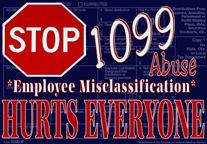Industry Leaders Want Lege to Fight "Payroll Fraud"
 Originally posted on The Texas Tribune:
Originally posted on The Texas Tribune:
Tycoons in commercial construction and homebuilding — industries often pegged as harbors for undocumented workers — are pushing back against some of their own, urging state lawmakers to close a loophole that guards employers against knowingly hiring illegal immigrants.
Stan Marek, the president and CEO of the Marek Family of Companies, an interior contracting company with offices statewide, said his industry is rife with contractors who purposely classify employees as subcontractors, or “1099” employees — a term gleaned from the employment form they fill out. Employers use this subcontractor classification to avoid paying payroll taxes, workers' compensation and overtime, Marek said, but also to avoid knowing their workers’ legal status.
Since 2006, Immigrations and Customs Enforcement has ramped up its inspections of I-9 forms, the federal employment eligibility verification. The popular misconception is that ICE deports workers the agency finds are ineligible to work in the U.S., but Marek said that’s not always the case. Many of these terminated workers go into the “underground economy,” he said, working for employers who will classify them as independent contractors.
The end result? Workers who used to be paid hourly wages and taxed on their income are now being paid cash and not contributing to tax rolls, Marek said.
“That, to me, is payroll fraud,” he said. “You have what is called a safe harbor. And that has not been tested in the courts in a long time, and everybody sort of sticks their heads in the sand and ignores it.”
Marek is part of a group of Texas Republicans who were instrumental in convincing the state party to adopt a more immigrant-friendly platform at its recent convention in Fort Worth. The “Texas solution” for immigration reform includes a secure border, alternatives to mass deportations and a national guest worker program.
But more can also be done at the state level, the group says. Marek and his colleagues will lobby the state Legislature to convince lawmakers to give the Texas Workforce Commission additional resources to aid in detecting what they consider to be payroll fraud. They argue that if the commission is granted an increase in resources for this task, it will mean a massive return on investment in the form of tax dollars paid by employers. A lot of those tax dollars are federal, Marek concedes, but the state certainly would see an uptick in revenue if employers paid what they were supposed to.
Marek isn’t alone in this thinking. The liberal Center for American Progress recently issued a report suggesting that legalizing undocumented workers would be a major boon to the state economy — to the tune of about $4.1 billion in annual tax revenue.
Other groups are less convinced. Numbers USA, a group that seeks to reduce legal and illegal immigration, says U.S. citizens should be the first priority. In 2011, the group notes, 1.5 million people aged 25 or younger with bachelor’s degrees were unemployed or underemployed.
That isn’t lost on the Texas businessmen. John Kafka, the owner of Chamberlin Roofing and Waterproofing, which has offices in Texas and Oklahoma, said addressing payroll fraud extends beyond correcting unscrupulous business practices.
“It’s not only an issue with undocumented workers but generally people who can’t defend themselves or are generally uneducated,” he said. “If we enforce the laws across the board, we would cure what ails us.”
A component of that lawbreaking includes employers reducing the wages they pay to people who don’t know they are being abused, or who are afraid to speak out.
“Legitimate business owners have to compete with that,” Kafka said. “The vast majority of construction work is awarded on a bid. If you have a low price, you’re going to get the work. What you end up doing is depressing the wages for the American worker.”
Marek said he has spoken with some state lawmakers who seemed amenable to the legislation. But he acknowledges that it won’t be an easy sell.
“We’ll probably push just on the commercial side because we’d get tremendous pushback from the homebuilding industry and the apartment association,” he said.
Related Content:




Comments
Facebook comments
Make sure to check out the comments on Facebook.